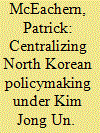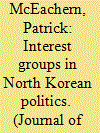| Srl | Item |
| 1 |
ID:
164309


|
|
|
|
|
| Summary/Abstract |
Following the death of North Korean leader Kim Jong Il in December 2011, Kim Jong Un assumed power and gradually transformed the policymaking environment in the Democratic People's Republic of Korea (DPRK or North Korea). While some analysts expected the young and inexperienced leader to face greater hardship than his father in managing the country, in this article I argue that Kim Jong Un faced an easier transition. Kim Jong Un inherited an economy, inter-Korean relationship, and strategic landscape in foreign affairs in a relatively favorable position relative to his father's formal succession. From this position of strength, Kim Jong Un has centralized governance in the Korean Workers' Party (KWP) and his personal leadership. Drawing on internal documents and media, I show that inter-institutional debate previously observable between the party, military, and government has largely vanished under Kim Jong Un and the political roles of the military and government have receded from a comprehensive set of national policy questions.
|
|
|
|
|
|
|
|
|
|
|
|
|
|
|
|
| 2 |
ID:
082210


|
|
|
|
|
| Publication |
2008.
|
| Summary/Abstract |
North Korea is often characterized as some form of highly centralized rule: totalitarian, posttotalitarian, corporatist, or personalistic. This article argues that much of the confusion around understanding North Korea's actions stems from misplaced models. Much of the current thinking on North Korea's politics does not account for the limited institutional plurality in the system. The article documents how the state's political institutions have changed since the country's founding and highlights the formal and informal roles of each major bureaucracy today. The Korean Workers Party and the role of Juche have declined, but the National Defense Commission and "military-first politics" have not taken their place as reigning supreme. Rather the interaction between the Korean Workers Party, military, and cabinet helps explain and moderate policy outcomes
|
|
|
|
|
|
|
|
|
|
|
|
|
|
|
|
| 3 |
ID:
159816


|
|
|
| 4 |
ID:
089519


|
|
|
|
|
| Publication |
2009.
|
| Summary/Abstract |
argue that North Korean politics is becoming pluralized. Policy outcomes are increasingly shaped by the interaction of the Cabinet, party, and military. Systematic content analysis of domestic articles and speeches suggests that policy preferences vary by institution. Second-echelon divisions are observable and help to shape policy more than has been previously argued
|
|
|
|
|
|
|
|
|
|
|
|
|
|
|
|